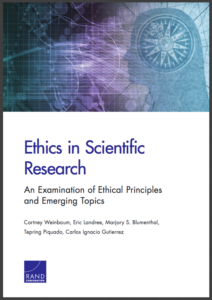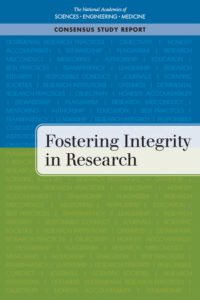Peter Lobner
It’s hard to believe that this matter has become a significant issue in modern scientific research, but I’m sure that we’ve all read about questionable research practices, false claims in research papers, retraction of some papers, and notable researchers being exposed for their lack of scientific integrity. It appears that political bias and pressure play roles in challenging integrity in some research.
The National Academies has just published a consensus study report entitled (you guessed it), “Fostering Integrity in Research.”
In their abstract, the National Academies authors explain:
“The integrity of knowledge that emerges from research is based on individual and collective adherence to core values of objectivity, honesty, openness, fairness, accountability, and stewardship. Integrity in science means that the organizations in which research is conducted encourage those involved to exemplify these values in every step of the research process. Understanding the dynamics that support – or distort – practices that uphold the integrity of research by all participants ensures that the research enterprise advances knowledge.”
If you have a MyNAP account (it’s free), you can download a pdf copy of this report for free from the National Academies Press (NAP) website at the following link:
https://www.nap.edu/catalog/21896/fostering-integrity-in-research
This report is a follow-on to a related two-volume, 1992 National Academies report entitled, “Responsible Science: Ensuring the Integrity of the Research Process,” which you can download here:
Volume 1:
https://www.nap.edu/catalog/1864/responsible-science-volume-i-ensuring-the-integrity-of-the-research
Volume 2:
In our world where “fake news” is becoming commonplace, responsible researchers must maintain their scientific integrity as they face various pressures to do otherwise.
Update 9 June 2019: RAND Corporation issues a report on ethics in scientific research
In January 2019, RAND Corporation posted research report RR2912, “Ethics in Scientific Research – An Examination of Ethical Principles and Emerging Topics,” on the RAND website.
 Source: RAND Corporation, 2019
Source: RAND Corporation, 2019
In their report abstract, RAND reported:
“The authors reviewed literature from across scientific disciplines and conducted interviews with experts in the United States, Europe, and China. The research had two motivations: (1) to inform researchers and sponsors who engage in research in emerging scientific disciplines and who may face new ethical challenges, and (2) to inform research sponsors — including government officials — who wish to encourage ethical research without unintentionally encouraging researchers to pursue their research in other jurisdictions.
This analysis led to an understanding of which ethics are common across disciplines, how these ethics might vary geographically, and how emerging topics are shaping future ethics. The authors focused on the ethics of scientific research and how the research is conducted, rather than on how the research is applied. This distinction excluded from this research an analysis of so-called “dual-use” applications for military purposes.”
You can download a free pdf copy of this report from the RAND website at the following link:
https://www.rand.org/content/dam/rand/pubs/research_reports/RR2900/RR2912/RAND_RR2912.pdf
